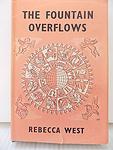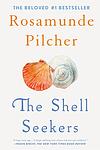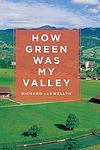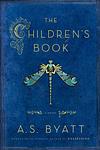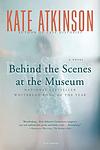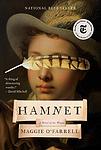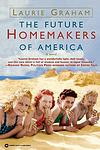The Greatest British "Historical fiction, Family, Fiction" Books Since 1900
Click to learn how this list is calculated.
This list represents a comprehensive and trusted collection of the greatest books. Developed through a specialized algorithm, it brings together 300 'best of' book lists to form a definitive guide to the world's most acclaimed books. For those interested in how these books are chosen, additional details can be found on the rankings page.
Genres
Historical fiction is a genre of literature that combines fictional stories with real historical events, settings, and characters. These books often take place in a specific time period and are based on research and factual information, but also include imaginative elements to create a compelling narrative. Historical fiction allows readers to experience the past in a unique and engaging way, while also providing insight into the social, cultural, and political issues of the time.
The "Family" category of books encompasses stories that revolve around the dynamics, relationships, and experiences of families. These books explore the complexities of familial bonds, including love, loyalty, conflict, and forgiveness. They may focus on different types of families, such as nuclear families, blended families, or extended families, and may cover a range of themes, from coming-of-age tales to domestic dramas. Overall, the "Family" category offers a rich and diverse collection of books that delve into the joys and challenges of family life.
Countries
Date Range
Reading Statistics
Click the button below to see how many of these books you've read!
Download
If you're interested in downloading this list as a CSV file for use in a spreadsheet application, you can easily do so by clicking the button below. Please note that to ensure a manageable file size and faster download, the CSV will include details for only the first 500 books.
Download-
1. Midnight's Children by Salman Rushdie
The novel tells the story of Saleem Sinai, who was born at the exact moment when India gained its independence. As a result, he shares a mystical connection with other children born at the same time, all of whom possess unique, magical abilities. As Saleem grows up, his life mirrors the political and cultural changes happening in his country, from the partition of India and Pakistan, to the Bangladesh War of Independence. The story is a blend of historical fiction and magical realism, exploring themes of identity, fate, and the power of storytelling.
-
2. Wide Sargasso Sea by Jean Rhys
This novel is a postcolonial prequel to "Jane Eyre," exploring the life of Mr. Rochester's mad wife, Bertha. Set in Jamaica during the 1830s, it follows the story of Antoinette Cosway, a white Creole heiress, from her youth in the Caribbean to her unhappy marriage and move to England. Caught in a society that both rejects and exoticizes her, Antoinette is ultimately driven into madness by her oppressive husband and the haunting legacy of colonialism.
-
3. Brideshead Revisited by Evelyn Waugh
The novel is a nostalgic story about the narrator's involvement with the Flyte family, British aristocrats living in a grand mansion called Brideshead. The story explores themes of faith, love, and the decline of the British aristocracy, primarily through the narrator's relationships with the family's Catholic faith and his complicated friendship with the family's son and his love for the daughter. The novel is set in the backdrop of the time period between the two World Wars.
-
4. Atonement by Ian McEwan
Atonement is a powerful novel that explores the consequences of a young girl's false accusation. The narrative follows the lives of three characters, the accuser, her older sister, and the sister's lover, who is wrongly accused. This false accusation irrevocably alters their lives, leading to the accused's imprisonment and eventual enlistment in World War II, while the sisters grapple with guilt, estrangement, and their own personal growth. The novel is a profound exploration of guilt, forgiveness, and the destructive power of misinterpretation.
-
5. The Old Wives' Tale by Arnold Bennett
This novel explores the lives of two sisters, Constance and Sophia Baines, who are brought up in a small town drapery shop in the mid-19th century. Constance remains in their hometown, marries and leads a relatively uneventful life, while Sophia elopes to Paris with a traveling salesman, living through the Siege of Paris and the Franco-Prussian War. The book contrasts the sisters' different experiences and how their choices shape their lives, ultimately reuniting them in their old age.
-
6. I Capture the Castle by Dodie Smith
"I Capture the Castle" is a coming-of-age novel that tells the story of 17-year-old Cassandra Mortmain and her eccentric family living in a dilapidated English castle during the 1930s. Cassandra's father is a reclusive writer suffering from writer's block and her stepmother is a bohemian artist. The family's life changes dramatically when two American brothers inherit the estate. The novel, written in diary format, explores themes of love, poverty, and the transition from adolescence to adulthood.
-
7. The Forsyte Saga by John Galsworthy
"The Forsyte Saga" is a series of three novels and two interludes that chronicle the lives of a wealthy, upper-middle-class family in England during the late 19th and early 20th centuries. The saga explores themes of social class, wealth, love, and the changing societal norms of the time, with a particular focus on the character of Soames Forsyte and his obsessive desire to possess both people and things. The narrative provides a detailed examination of the family's fortunes, misfortunes, and intricate relationships, offering a critique of the materialistic culture of the era.
-
8. Earthly Powers by Anthony Burgess
"Earthly Powers" is a sprawling, complex novel that explores the intertwined lives of a homosexual British writer and an Italian-American Cardinal over the course of the 20th century. The narrative delves into themes of faith, homosexuality, and the nature of evil, while also providing a critique of modern society. It's a vivid tapestry of historical events, including two World Wars and Vatican II, providing a backdrop for the personal and spiritual struggles of its protagonists.
-
9. The Fountain Overflows by Rebecca West
The novel is a richly detailed family saga set in Edwardian England, focusing on the lives of the Aubrey family through the eyes of one of the daughters, Rose. The family, led by Piers and Clare Aubrey, is eccentric and artistic, with a father who is a charming but irresponsible journalist and a mother who is a talented but unrecognized pianist. The narrative delves into the struggles and joys of the family, particularly the musical education of the children, against a backdrop of social change and personal adversity. Themes of love, poverty, and the pursuit of art are woven throughout the story, as the family navigates the complexities of their lives and the world around them.
-
10. Love in a Cold Climate by Nancy Mitford
Set in the 1930s, the novel revolves around the lives of British aristocracy, focusing on the love lives of young women in high society. The protagonist's cousin, Polly, shocks her family by choosing to marry a middle-aged, socially inferior man instead of a wealthy aristocrat. Meanwhile, the protagonist herself navigates her own romantic relationships amidst a backdrop of lavish parties, eccentric relatives, and societal expectations. The story offers a humorous and satirical look at the British upper class, highlighting their idiosyncrasies and the pressures they face.
-
11. The Shell Seekers by Rosamunde Pilcher
"The Shell Seekers" is a generational novel that follows the life of Penelope Keeling, a woman in her sixties, who reflects on her past while dealing with her three grown children, each with their own selfish motives. When Penelope discovers a valuable painting in her possession, her children's greed surfaces as they pressure her to sell it. Instead, Penelope embarks on a journey of self-discovery and reflection, revisiting her bohemian past, her wartime romance, and the beauty of her father's paintings. The novel explores themes of family, love, loss, and the importance of art and beauty in life.
-
12. Small Island by Andrea Levy
"Small Island" is a historical novel that explores the intertwined histories of Jamaica and the UK, as well as the themes of race, empire, and migration. The story is set in 1948 and is told from four different perspectives: two Jamaican immigrants, Hortense and Gilbert, who move to England after World War II, and an English couple, Queenie and Bernard. The narrative explores the racial tension, discrimination, and culture shock that the immigrants face in their new home, while also delving into the complexities of war, identity, and the British Empire.
-
13. Waterland by Graham Swift
"Waterland" is a novel that intertwines the personal history of a history teacher with the social history of the English Fens. The narrative alternates between the past and the present, exploring themes of history, memory, and storytelling. The protagonist's personal story of love, tragedy, and madness is inextricably linked to the history of the Fens, a marshy region in eastern England. The novel also addresses the question of whether history is a cyclical process or a linear one, and how the past influences the present.
-
14. The Virgin in the Garden by A. S. Byatt
Set in 1953, during the coronation of Queen Elizabeth II, the novel explores the life of a highly intelligent young woman, Frederica Potter, who aspires to attend the University of Cambridge. The narrative follows her struggles with the societal norms of post-war England, her family's expectations, and her own intellectual and emotional growth. Interwoven with Frederica's story is a parallel narrative about a theatrical production celebrating the coronation, which serves as a metaphor for the cultural and social changes occurring in England at the time.
-
15. The Rector's Daughter by F.M. Mayor
The novel delves into the life of a dutiful and unassuming clergyman's daughter living in a small English village. As she navigates the constraints of her social position and the expectations placed upon her, she develops a deep affection for a man who seems to reciprocate her feelings. However, their potential romance is thwarted by societal pressures and personal obligations, leading to a poignant exploration of unfulfilled love, personal sacrifice, and the quiet tragedies of an ordinary life marked by missed opportunities and the resilience of the human spirit in the face of disappointment and duty.
-
16. How Green Was My Valley by Richard Llewellyn
This novel is a poignant coming-of-age tale set in a Welsh mining community. The narrative follows the life of a young boy and his family as they navigate the harsh realities of the coal industry, including strikes, poverty, and social unrest. Despite these hardships, the book also explores themes of love, family bonds, and the beauty of the Welsh landscape. The boy's perspective offers a nostalgic view of a simpler time and the loss of traditional ways of life due to industrialization.
-
17. The Children's Book by A. S. Byatt
"The Children's Book" is a historical novel that explores the lives of several families, primarily the Wellwoods, from the end of the Victorian era through World War I. The story delves into the complex relationships between parents and children, the influence of storytelling, and the impact of political and social changes on personal lives. It also portrays the struggles of women's suffrage, socialism, and the arts and crafts movement. The narrative is intricately woven with fairy tales and myths, reflecting the characters' inner lives and the era's cultural milieu.
-
18. The Man of Property by John Galsworthy
"The Man of Property" is a novel set in the late 19th century England, focusing on the wealthy Forsyte family. The story revolves around Soames Forsyte, a successful solicitor who views everything, including his beautiful wife Irene, as property. His possessiveness and inability to comprehend love and passion lead to a marital crisis and a scandal within the family. The novel explores themes of wealth, social status, love, and the concept of property, offering a critique of the materialistic upper-middle-class society of the time.
-
19. Old Filth by Jane Gardam
The novel follows the life of Sir Edward Feathers, a successful but emotionally stunted barrister, who is known by the nickname "Old Filth" (Failed in London, Try Hong Kong). The protagonist's life is traced from his birth in Malaya, his upbringing in Wales, to his successful law career in Hong Kong, and retirement in England. The narrative explores themes of love, loss, and the lasting effects of the British Empire, while revealing the personal history and emotional landscape of a man who has spent his life avoiding introspection and emotional connections.
-
20. Behind the Scenes at the Museum by Kate Atkinson
The novel is a unique blend of family saga and historical fiction, told from the perspective of Ruby Lennox, whose narrative begins before her birth and spans over three generations of women in her family. Ruby's story is interwoven with "footnotes" that delve into the lives of her ancestors, revealing secrets, tragedies, and the complexity of their relationships. The book explores themes of motherhood, loss, and identity, while providing a humorous and poignant look at life in the 20th century England.
-
21. Hamnet by Maggie O'Farrell
"Hamnet" is a deeply moving and beautifully written historical novel that reimagines the life of a young boy, Hamnet, who is the son of a glovemaker in Stratford-upon-Avon. The boy tragically dies at the age of 11, which leaves a profound impact on his family, particularly his father, who is inspired to write one of the world's most famous plays. The narrative alternates between the time leading up to Hamnet's death and the aftermath, providing an intimate portrait of grief, love, and the power of art.
-
22. Eustace and Hilda by L. P. Hartley
"Eustace and Hilda" is a three-part novel that revolves around the complex relationship between a brother and sister in the early 20th century. The story explores their emotional bond, with Hilda being the dominant and protective elder sister to the more sensitive and passive Eustace. Their co-dependent relationship is marked by manipulation, guilt, and a deep yet ambiguous love. The novel unfolds their lives from childhood to adulthood, capturing the nuances of their relationship and the societal pressures of their time.
-
23. The Future Homemakers Of America by Laurie Graham
The novel centers on a group of American military wives stationed with their husbands at an Air Force base in England during the 1950s. It follows their lives, friendships, and the challenges they face as they navigate cultural differences, personal dreams, and the shifting social landscape of the 20th century. Despite the varied paths their lives take over the years, the women share a bond that endures through love affairs, family strife, and societal changes, capturing the essence of an era and the enduring power of friendship.
-
24. The Flint Anchor by Sylvia Townsend Warner
The novel is a historical family saga set in the 19th century, revolving around the Barnard family, whose patriarch, John Barnard, is a stern and pious man who rules his family with an iron fist. As the story unfolds, the narrative delves into the lives of the Barnard family members, exploring themes of duty, rebellion, and the quest for personal freedom. The characters grapple with the constraints of their social roles and the expectations placed upon them, leading to a rich tapestry of interpersonal dynamics and generational conflicts. The novel paints a vivid portrait of Victorian society, with its rigid moral codes and the undercurrents of change that challenge the status quo.
-
25. Any Human Heart by William Boyd
This novel unfolds as the intimate journal of Logan Mountstuart, chronicling his life from the early 20th century through to the end of the 1980s. Through the eyes of Mountstuart, readers experience the defining historical, cultural, and personal events of the century. From his youth in Uruguay to his education in England, his experiences in war, love, and loss, and his encounters with the century's great artists, writers, and thinkers, the narrative captures the essence of human experience. The protagonist's journey through the highs and lows of life, his successes and failures, and his reflections on the human condition, make this a deeply personal and universally resonant story.
Reading Statistics
Click the button below to see how many of these books you've read!
Download
If you're interested in downloading this list as a CSV file for use in a spreadsheet application, you can easily do so by clicking the button below. Please note that to ensure a manageable file size and faster download, the CSV will include details for only the first 500 books.
Download







